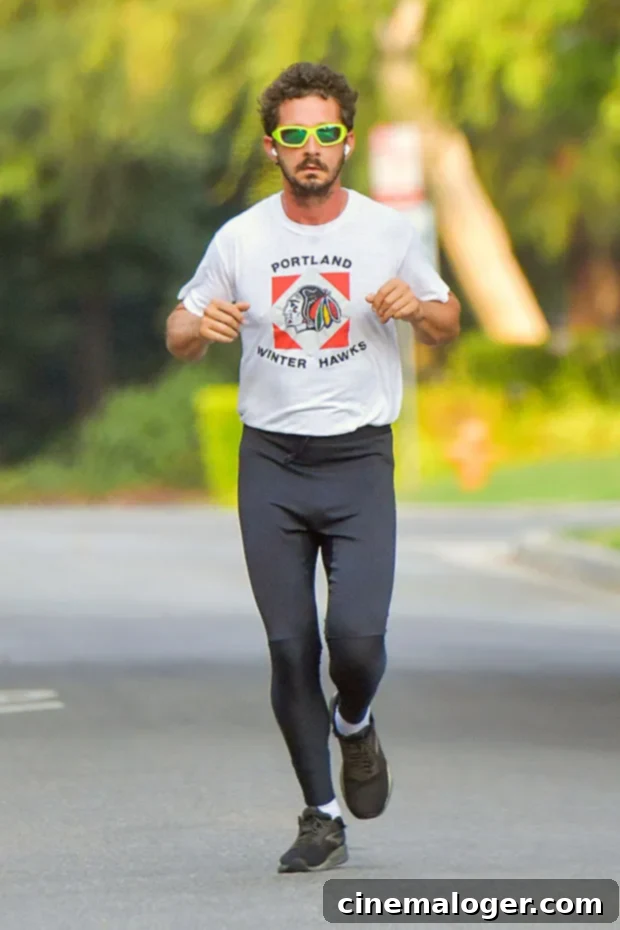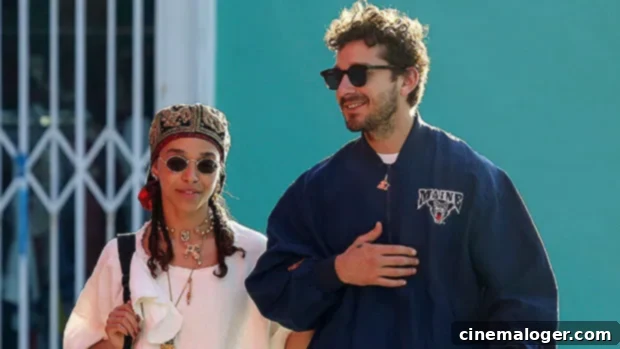From Silence to Solidarity: FKA twigs’ Landmark Lawsuit Against Shia LaBeouf and Her Empowering Call for Abuse Awareness
Renowned artist FKA twigs, born Tahliah Debrett Barnett, has bravely stepped forward to share her deeply personal and harrowing experience of being in an emotionally and physically abusive relationship. Her decision to file a lawsuit against her former boyfriend, actor Shia LaBeouf, 34, for sexual battery, assault, and the infliction of emotional distress, has sent shockwaves through the entertainment industry and ignited crucial conversations about intimate partner violence. The lawsuit, filed on December 11, 2020, in Los Angeles Superior Court, marks a significant moment for twigs, who, through her courage, aims to shed light on the pervasive issue of abuse and offer solidarity to countless others.
FKA twigs confessed that she “never thought” she would find herself embroiled in such a toxic and dangerous dynamic. This sentiment resonates with many survivors, challenging the common misconception that only certain individuals are susceptible to abusive relationships. Her vulnerability in admitting this initial disbelief underscores the insidious nature of coercive control and the often gradual erosion of a victim’s autonomy and self-worth. By sharing her story, twigs hopes to dismantle these societal stigmas and empower those silently suffering to recognize their experiences and seek help.
FKA twigs Breaks Her Silence: A Personal Account of Abuse and Empowerment
On the same day her lawsuit became public, FKA twigs took to Twitter to directly address her fans and the wider public, providing a raw and honest account of her journey. She expressed the profound difficulty in processing her ordeal, both during and after the relationship. Her tweets highlighted a critical aspect of abusive relationships: the profound isolation and the feeling that “leaving doesn’t feel like a safe or achievable option.” This is a key characteristic of coercive control, where abusers systematically strip victims of their independence, support networks, and self-belief, making escape seem impossible.
which is why i have decided it’s important for me to talk about it and try to help people understand that when you are under the coercive control of an abuser or in an intimate partner violent relationship leaving doesn’t feel like a safe or achievable option.
— FKA twigs (@FKAtwigs) December 11, 2020
Her openness about the emotional and physical abuse she endured is a testament to her strength. FKA twigs articulated that her primary motivation for going public was not to seek revenge or simply air grievances, but to serve a greater purpose: to help others understand the complexities of abuse and to ensure that no one feels alone in their suffering. She stated, “I hope that by sharing my experience I can truly help others feel like they are not alone and shed some light on how those who are worried somebody they care about may be in an abusive relationship can help, because I understand it can be confusing and hard to know what to do.” This statement encapsulates her commitment to fostering empathy and providing tangible guidance for both victims and their allies.
Understanding Coercive Control and the Broader Fight Against Domestic Violence
FKA twigs’ narrative powerfully illustrates the concept of coercive control, a pattern of behavior that goes beyond isolated incidents of physical violence. It encompasses emotional manipulation, intimidation, isolation, financial abuse, and other tactics designed to dominate and control a victim. The singer emphasized that within such relationships, the abuser systematically erodes the victim’s sense of self and reality, making the act of leaving seem insurmountable. This dynamic is crucial for the public to understand, as it often explains why victims may appear to stay in harmful situations.
the statistics on domestically abusive and intimate partner violence relationships are shocking and during covid i have been really anxious because i know many victims will have been literally trapped with their abusers with no relief or way to get out.
— FKA twigs (@FKAtwigs) December 11, 2020
Beyond her personal experience, FKA twigs highlighted the alarming rise in domestic violence statistics, particularly exacerbated by the COVID-19 pandemic lockdowns. Her anxiety over this issue stems from the knowledge that many victims were “literally trapped with their abusers with no relief or way to get out.” This observation aligns with global reports indicating a significant surge in domestic abuse cases as victims were isolated from their support systems and forced into constant proximity with their aggressors. The pandemic created a perfect storm for abusers to exert greater control, turning homes into dangerous prisons for many.

The issue of domestic violence transcends social status, fame, or financial standing. As twigs’ case illustrates, even individuals with robust public platforms and perceived strong support networks can fall victim. This challenges the harmful stereotype that abuse only affects certain demographics, reinforcing the message that it can happen to anyone, anywhere. Her decision to speak out, despite her celebrity status, therefore serves as a powerful testament to the universality of this problem and the critical need for open dialogue and systemic change.
The Relationship: From “Honey Boy” to Legal Battle
FKA twigs and Shia LaBeouf’s relationship reportedly began in 2018, shortly after they concluded filming for LaBeouf’s autobiographical movie, Honey Boy. Their relationship lasted for less than a year, but within that relatively short period, FKA twigs alleges a pattern of severe physical, emotional, and mental abuse. The lawsuit details harrowing accusations, including claims of sexual battery, assault, and the intentional infliction of emotional distress, painting a grim picture of her time with the actor.
Speaking to The New York Times, twigs reiterated her purpose in making her story public: to explain how even someone with considerable resources—fame, financial stability, and a supportive network—could become ensnared in an abusive relationship. This perspective is vital for debunking myths that portray victims as weak or lacking in resources, highlighting instead the cunning and manipulative tactics employed by abusers. Her transparency aims to strip away the shame often associated with being a survivor, encouraging a more compassionate and understanding societal response.
Shia LaBeouf’s Acknowledgment and Apology
In response to the serious allegations, Shia LaBeouf issued a statement via email to The New York Times, acknowledging his past destructive behavior. He stated, “I’m not in any position to tell anyone how my behavior made them feel. I have no excuses for my alcoholism or aggression, only rationalizations.” The Transformers star continued, “I have been abusive to myself and everyone around me for years. I have a history of hurting the people closest to me. I’m ashamed of that history and am sorry to those I hurt. There is nothing else I can really say.”

LaBeouf’s statement, while not directly addressing the specifics of twigs’ claims, broadly admits to a history of aggressive and abusive conduct, fueled by alcoholism. His acknowledgment of being “abusive to myself and everyone around me for years” and his expressed shame and sorrow offer a glimpse into the complexities of accountability. While such an apology may not undo the harm caused, it marks a public admission of fault that is often rare in high-profile cases of alleged abuse, paving the way for further legal and personal reckonings.
A Call to Action: Supporting Survivors and Ending the Cycle of Abuse
FKA twigs’ profound commitment to helping others is perhaps best encapsulated in her poignant reflection: “My second worst nightmare is being forced to share with the world that I am a survivor of domestic violence. My first worst nightmare is not telling anyone and knowing that I could have helped even just one person by sharing my story.” This powerful statement underscores the immense courage it takes for survivors to come forward, often at great personal and professional cost, for the benefit of others.
To provide tangible support, she actively encouraged her followers to donate to and contact organizations dedicated to aiding survivors of domestic violence. She specifically tagged and recommended @freefromorg, @ndvh (National Domestic Violence Hotline), and @Sistah_Space. These organizations provide crucial services, including emergency shelters, legal aid, counseling, and emotional support, for those navigating abusive situations. Her platform as a globally recognized artist lends significant weight to these calls for support, hopefully directing much-needed resources to these vital services.
here are some amazing charities and helplines that i recommend donating to and calling if you or somebody you know needs support…@freefromorg @ndvh @Sistah_Space
— FKA twigs (@FKAtwigs) December 11, 2020
The lawsuit brought by FKA twigs against Shia LaBeouf is more than just a personal legal battle; it is a powerful catalyst for change. It sheds light on the often-hidden realities of domestic abuse, particularly within high-profile relationships, and reinforces the idea that no one is immune. Her unwavering commitment to using her voice for the collective good serves as an inspiration, reminding us all of the importance of believing survivors, understanding the complexities of abuse, and actively working towards a world free from violence. By speaking out, FKA twigs has not only sought justice for herself but has also extended a lifeline of hope and solidarity to countless individuals worldwide.
